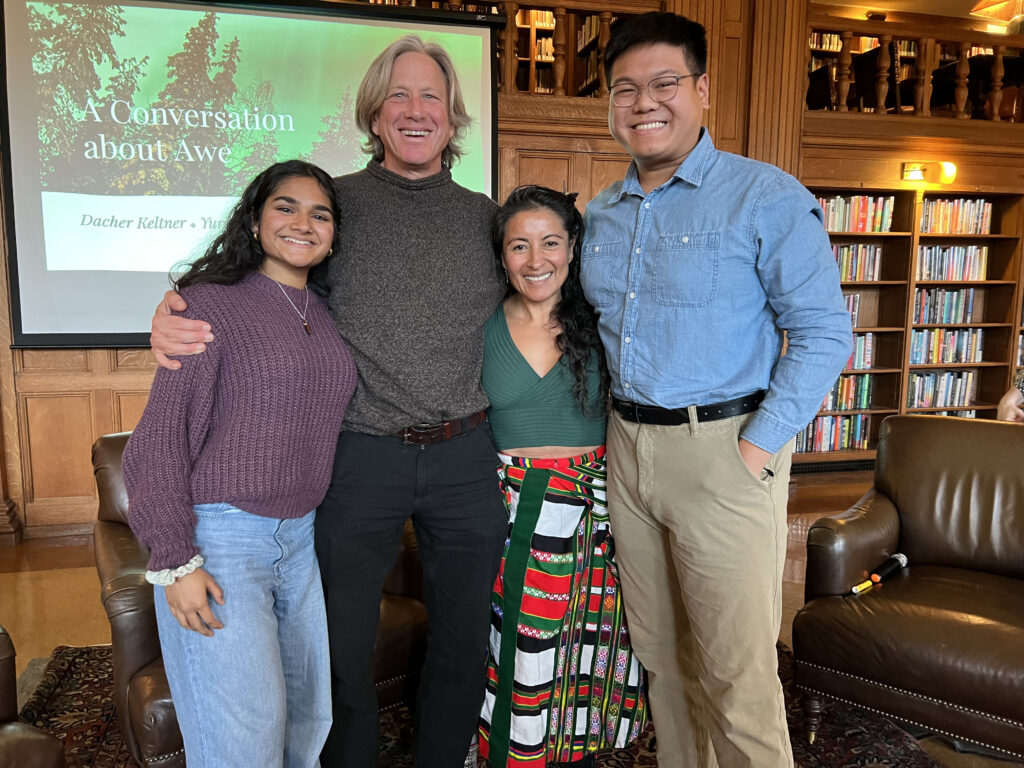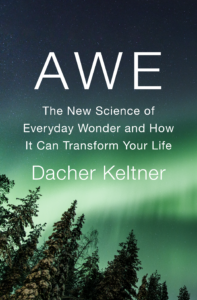
In his new book Awe: The New Science of Everyday Wonder and How it Can Transform Your Life, Dacher Keltner, UC Berkeley professor of psychology, defines awe as “the emotion we experience when we encounter vast mysteries that we don’t understand.” In his recent book talk, he introduced a receptive crowd to this concept, and how it is distinct from bliss, ecstasy, or gratitude. It is an emotion of mystery, of goosebumps. Keltner has even served as an “awe consultant,” guiding Pixar films on how to incorporate awe in the films Inside Out, and Soul.
When Prof essor Keltner was joined in conversation with three colleagues and an audience of a hundred in the Morrison Library on February 27, the discussion touched on many aspects of this emotion. Yuria Celidwen, a senior fellow at the Othering & Belonging Institute, spoke about transcendent experiences as conceptualized in indigenous cultures and how the elders in her Chiapas, Mexico community teach about a sense of reverence for nature or “ecological belonging.” Wesley Lu, a fourth year undergraduate and a student mental health advocate, spoke about collective effervescence — when a life force creates a collective self whether in a classroom, during a religious ceremony or among sports fans.
essor Keltner was joined in conversation with three colleagues and an audience of a hundred in the Morrison Library on February 27, the discussion touched on many aspects of this emotion. Yuria Celidwen, a senior fellow at the Othering & Belonging Institute, spoke about transcendent experiences as conceptualized in indigenous cultures and how the elders in her Chiapas, Mexico community teach about a sense of reverence for nature or “ecological belonging.” Wesley Lu, a fourth year undergraduate and a student mental health advocate, spoke about collective effervescence — when a life force creates a collective self whether in a classroom, during a religious ceremony or among sports fans.
And no conversation about awe, especially in Berkeley, is complete without a discussion of plant medicine; third year undergraduate Mridini Vijay, also a campus mental health advocate, asked Celidwen to discuss her research on the topic that is commonly, though incorrectly, referred to as psychedelics. In Ethical Indigenous Medicine to Guide Western Psychedelic Research and Practice (The Lancet Regional Health – Americas (February 2023)), which Keltner described as “one of the most important papers on psychedelics ever published,” Celidwen and colleagues discuss concerns by Indigenous Nations over the cultural appropriation and exclusionary practices of psychedelic use in the West and the false notion that plant medicine is somehow the “one key pill to human enlightenment.” In fact, there is evidence that a daily practice incorporating “understanding, kindness, gratitude and reverence” may be as good as or better than psychedelics. In the end, there is so much more to learn about awe, and how we may experience it in our daily lives. Keltner’s book is a wonderful starting point for that journey.